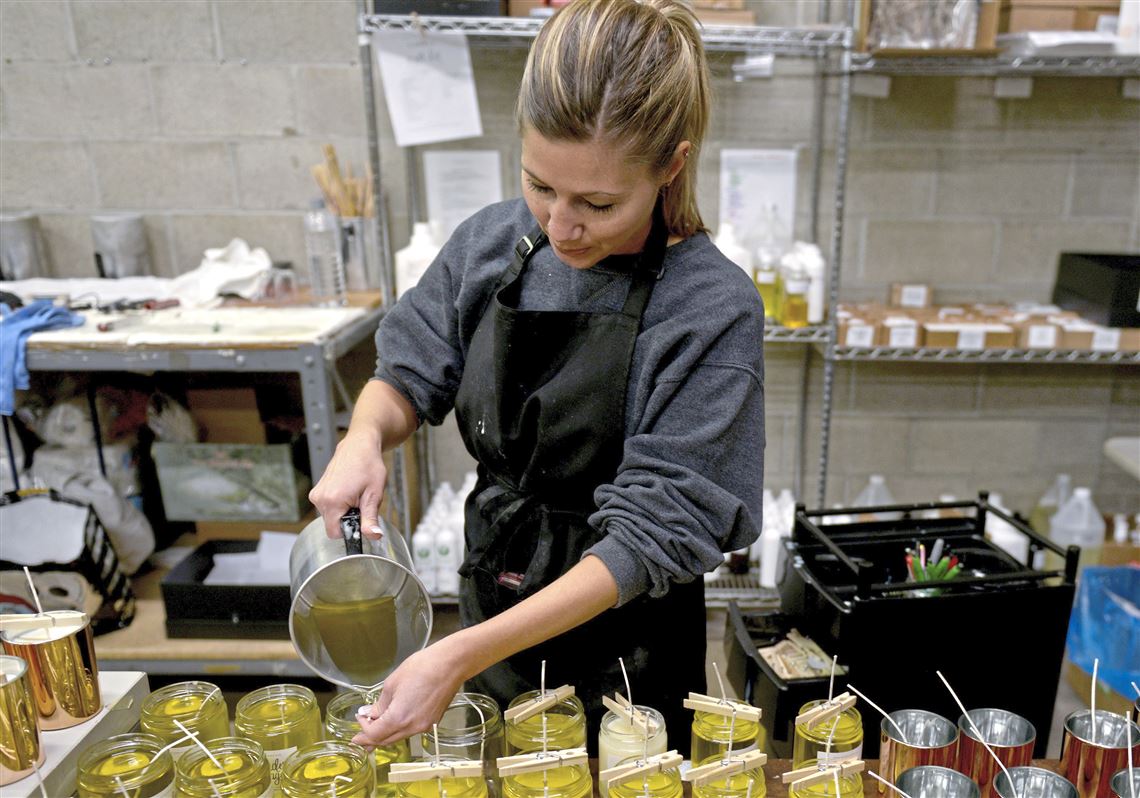In a corner of a warehouse in Leetsdale, Barbie Chapman carefully pours hot wax into decorative candle jars. The wicks are secured with clothespins until the wax dries. The air is heavy with dozens of scents: cedar, vanilla, grapefruit, lavender.
She makes about 200 candles a day — and more ahead of the holiday shopping season.
Everything else sold by Sweet Water Decor is designed at the Sewickley home of owner Melissa Horvath. She specializes in hand-lettered items — journals, makeup bags, mugs. The shelves near the candle-making area at All Star Fulfillment are stocked with them. The warehouse handles shipping for several businesses.
Ms. Horvath launched the business in 2014 on the craft website Etsy.com and eventually was able to quit her day job in the finance department at FedEx when the online business took off.
“I would be in the basement working in my spare time,” she said. “I felt a calling to start my own business. I just didn’t know what it would be at first.”
Her DIY nature kept pushing her. When she was planning her wedding in 2015 with her husband, Chris — he joined the company full time in 2017 — she browsed for invitations.
“I realized I could make my own wedding invitations. Then I started making mugs,” she said. “It was like a snowball that kept rolling — coffee mugs led to travel mugs and then makeup bags.”
Then things moved to a different level.
In 2016, Sweet Water was tapped by e-commerce giant Amazon to join its Amazon Handmade service. Ms. Horvath said Amazon found the company through its Etsy shop.
“We were shipping so many items that we thought it would be easier to ship through Fulfillment by Amazon,” she said, referring to the company’s service that handles warehousing and shipping for third-party vendors on merchandise sold through its site. “That was a lifesaver.”
Now Sweet Water averages about 4,000 orders a month, the bulk of which come through Amazon. All Star Fulfillment handles the rest.
Third-party vendors are becoming a big part of the Seattle-based online retailer’s business. In a letter to shareholders in April, CEO Jeff Bezos said that in 2017, for the first time, more than half of the units sold on Amazon worldwide were from third-party sellers.
“Over 300,000 U.S.-based [small- and medium-sized businesses] started selling on Amazon in 2017, and Fulfillment by Amazon shipped billions of items for SMBs worldwide.” Amazon makes money through fees associated with the service.
David Silverman, an analyst at Fitch Ratings, said services like the fulfillment program are part of the company’s modus operandi.
“This is part of their business model of building core capabilities and competencies that can be used internally but also offered to third parties,” he said, citing another example, Amazon Web Services, which provides cloud computing platforms to individuals, companies and governments.
“It’s not an empire build in the way of increasing their own merchandise sales,” Mr. Silverman said. “In some ways they’re supporting competitors.”
Ms. Horvath did not disclose the company’s revenue. It has two full-time employees and 3 part-timers.
For Sweet Water Decor, the company was profitable by the second month of operation, Ms. Horvath said. “I bought fonts for about $78. It’s self-funded. We didn’t have physical inventory until the first year.”
Stephanie Ritenbaugh: sritenbaugh@post-gazette.com; 412-264-3910; Twitter: @StephanieRit
First Published: May 8, 2018, 12:30 p.m.















